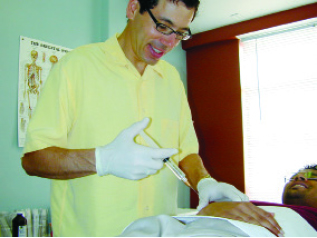
Always choose fresh, real food! Find these by shopping along the periphery of the grocery stores and at a local farmers’ market. Aim to eat fresh vegetables and fresh protein, such as poultry, fish and/or meats, whole grains, occasional organic dairy and fruits.
Get unstuck from the junk food rut. Packaged foods may be inexpensive, but are full of unhealthy filler ingredients and preservatives. They have very little nutritional value. When junk foods are consumed, the body recognizes them as toxins and essentially attacks itself. This results in an overproduction of insulin and increased fat storage.
Eliminate soda. This includes both regular soda, and sugar-free beverages that use artificial sweeteners. Eliminating excess sugar in addition to “diet” sugar substitutes helps to halt the attack on the body and reduce the detrimental effects on your health.
Incorporate healing foods. To heal any bodily structure, essential nutrients are needed. This includes the spectrum of amino acids, fatty acids, vitamins, minerals, and trace elements. Some foods help to specifically decrease the systemic inflammation that can hinder the body’s immune system and healing.
• Salmon is a well-known source of omega-3 fatty acids. The fatty acids, specifically eicosapentaenoic acid (EPA) and docosahexaenoic acid (DHA), may improve functional ability and diminish the pain in a myriad of diseases.
• Onions and garlic both possess anti-inflammatory agents that help with chronic pain.
• Berries are excellent sources of antioxidants.
• Sweet potatoes have a beautiful orange color which indicates its high amount of carotenoids, a powerful antioxidant that fights systemic inflammation.
• Ginger and turmeric are spices that create delicious flavor and also act as analgesics, or pain relievers, among other health benefits. These ingredients are often found as nutritional supplements. Potency matters and will differ greatly from brand to brand. Seeking advice from a healthcare practitioner who works with pharmaceutical grade supplements can be worthwhile for people who would like to begin a natural supplement regimen for pain.
Avoid food sensitivities. Sensitivities to the food we eat can cause pain and prevent the body from healing. When we are sensitive to a particular food, our immune system responds adversely, because our body mistakes a particular food as a dangerous substance. This may result in a systemic inflammation that can produce long-term resistance to healing, as well as fatigue, bloating, body pain, and other symptoms. Some healthcare practitioners may recommend a person to follow a hypoallergenic diet free of common food allergens such as wheat, dairy, and eggs. In addition, some may find it helpful to do specific blood tests with a practitioner that look for delayed immune reactions from specific foods.
Lose excess weight. Excess weight places
increased pressure on ligaments that hold our joints together, especially in the lower back, hip, and knee areas. When these ligaments stretch and weaken, joint instability can occur, beginning the degenerative process leading to osteoarthritis. Weight loss is often effective for decreasing joint pain because it diminishes the stress on the joints.
Address residual joint instability.
When a person has tried making dietary adjustments as well as other lifestyle changes, but still suffers with chronic joint pain, a regenerative medicine approach may be helpful. Prolotherapy is a natural injection treatment that stimulates the body to repair painful areas by encouraging the growth or regeneration of injured tissue. It is used for treating sports injuries, arthritis, back pain, and all types of painful conditions. Prolotherapy restarts the healing cascade in joints, which requires the work of a strong immune system. Therefore, Prolotherapy is an ideal treatment for people who wishto maintain a healthy diet and active lifestyle.
Never underestimate the power of food.
Chronic pain may persist due to eating processed foods, consuming too much sugar, having food sensitivities or nutritional deficiencies and being overweight. When coupled with joint instability, injury, or arthritis, this can be a painful and debilitating mix. Working with regenerative medicine practitioners who specialize in developing individualized treatment and nutrition plans may help increase mobility and alleviate pain.
Prolotherapy Specialists:
Ross A. Hauser, MD.
Danielle R. Steilen. MMS, PA-C
Timothy L. Speciale, DO
(239) 303.4069 | www.CaringMedical.com
 South Florida Health and Wellness Magazine Health and Wellness Articles
South Florida Health and Wellness Magazine Health and Wellness Articles




